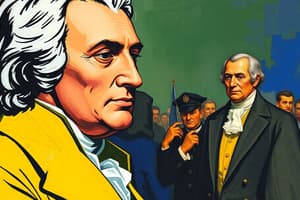Podcast
Questions and Answers
India established itself as a parliamentary democracy characterized by a federal structure and a written constitution. It has seen several democratic transitions and maintained relative stability despite occasional periods of ______.
India established itself as a parliamentary democracy characterized by a federal structure and a written constitution. It has seen several democratic transitions and maintained relative stability despite occasional periods of ______.
unrest
Many African states often struggled during their initial years of independence due to weak institutions, political turmoil, civil wars, coups d'état, and military ______.
Many African states often struggled during their initial years of independence due to weak institutions, political turmoil, civil wars, coups d'état, and military ______.
dictatorships
India implemented policies focused on industrial growth and agricultural modernization. Its economy is now one of the fastest growing in the world. Despite challenges such as income inequality and regional disparities, India has made significant strides toward achieving ______.
India implemented policies focused on industrial growth and agricultural modernization. Its economy is now one of the fastest growing in the world. Despite challenges such as income inequality and regional disparities, India has made significant strides toward achieving ______.
self-reliance
Many African countries face ongoing struggles to achieve economic prosperity. Challenges include lack of infrastructure, mismanagement, and foreign aid ______.
Many African countries face ongoing struggles to achieve economic prosperity. Challenges include lack of infrastructure, mismanagement, and foreign aid ______.
While India has largely embraced democracy and economic development, Africa continues to navigate complex political landscapes and work towards sustainable ______.
While India has largely embraced democracy and economic development, Africa continues to navigate complex political landscapes and work towards sustainable ______.
Study Notes
Comparison of Political Evolution Between Africa and India
Africa and India have followed distinct paths in their journey towards political independence and development. While both continents have faced unique challenges and opportunities, they have also shared some similarities in their political evolutions.
Background
India gained its freedom from British rule on August 15, 1947, while most African countries became independent after 1960. The struggle for self-governance in Africa was fueled by the desire to escape colonialism and assert racial equality against European powers. In contrast, India's political independence was a result of a more complex process involving negotiations with Britain and redefining its relations within South Asia.
India's Struggle for Independence
The Indian National Congress emerged as a major force advocating for constitutional reforms and eventual independence under Mahatma Gandhi's leadership. This movement culminated in India gaining sovereignty through a peaceful transfer of power in the middle of the twentieth century.
Africa's Decolonization Movement
African decolonization took place during the post-World War II era when nationalist movements across the continent sought self-rule. Various factors contributed to this shift, including economic stagnation, increased social consciousness among the African populace, and international pressure from newly formed organizations like the United Nations.
Post-Independence Politics
In the wake of independence, both India and Africa had to grapple with various issues such as poverty, corruption, economic instability, and internal conflict. However, their approaches to these challenges differed significantly.
India's Political Development
India established itself as a parliamentary democracy characterized by a federal structure and a written constitution. It has seen several democratic transitions and maintained relative stability despite occasional periods of unrest.
Africa's Political Developments
African states often struggled during their initial years of independence due to weak institutions, political turmoil, civil wars, coups d'état, and military dictatorships. Many countries saw multiple regime changes before eventually stabilizing into democracy or authoritarian regimes.
Economic Transformations
Both India and Africa embarked on ambitious plans to transform their economies following independence.
India's Economic Growth
India implemented policies focused on industrial growth and agricultural modernization. Its economy is now one of the fastest growing in the world. Despite challenges such as income inequality and regional disparities, India has made significant strides toward achieving self-reliance.
Africa's Economic Progress
Many African countries face ongoing struggles to achieve economic prosperity. Challenges include lack of infrastructure, mismanagement, and foreign aid dependency. However, there have been pockets of success, particularly in countries like Rwanda and Ghana, which have shown promising economic progress in recent decades.
Conclusion
Despite sharing a common history of colonialism and seeking independence, the political evolutions of Africa and India have diverged significantly. While India has largely embraced democracy and economic development, Africa continues to navigate complex political landscapes and work towards sustainable development. Both regions face unique challenges and require continued attention and support from the global community as they strive for peace, prosperity, and good governance.
Studying That Suits You
Use AI to generate personalized quizzes and flashcards to suit your learning preferences.
Description
Test your knowledge on the political evolution of Africa and India, examining their paths to independence, post-independence politics, and economic transformations. Explore the similarities and differences between these two regions' journeys towards self-governance and development.




